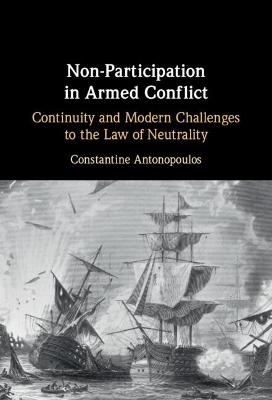
Non-Participation in Armed Conflict
Continuity and Modern Challenges to the Law of Neutrality
Seiten
2022
Cambridge University Press (Verlag)
978-1-316-51462-7 (ISBN)
Cambridge University Press (Verlag)
978-1-316-51462-7 (ISBN)
This book offers a fresh and comprehensive look into a traditional area of international law, addressed to academics, practitioners, graduate students and military personnel. It demonstrates that neutrality is relevant and valid despite challenges by collective security, prohibition of force and limitations of application in civil and cyber wars.
Non participation in armed conflict gives rise to the relevance, role and content of the law of neutrality in contemporary international law. Despite scholarly opinion to the contrary the challenges posed by collective security and the prohibition of the use of force have not made neutrality obsolete. The validity of the law of neutrality is reaffirmed in State practice, mainly in the form of national military manuals, and the case-law of international tribunals. The legal framework of neutrality remains unchanged with respect to most rules. At the same time, it has been adapted to the evolution of the law of the sea as a result of the 1982 UN Law of the Sea Convention, the globalization of trade and the use of cyberspace in armed conflict. This has been achieved mainly through soft law documents and national military manuals. Neutrality, however, remains inapplicable in non-international armed conflict.
Non participation in armed conflict gives rise to the relevance, role and content of the law of neutrality in contemporary international law. Despite scholarly opinion to the contrary the challenges posed by collective security and the prohibition of the use of force have not made neutrality obsolete. The validity of the law of neutrality is reaffirmed in State practice, mainly in the form of national military manuals, and the case-law of international tribunals. The legal framework of neutrality remains unchanged with respect to most rules. At the same time, it has been adapted to the evolution of the law of the sea as a result of the 1982 UN Law of the Sea Convention, the globalization of trade and the use of cyberspace in armed conflict. This has been achieved mainly through soft law documents and national military manuals. Neutrality, however, remains inapplicable in non-international armed conflict.
Constantine Antonopoulos is Associate Professor of Public International Law at the Faculty of Law, Democritus University of Thrace. He is a member of several academic societies, including the American Society of International Law; the European Society of International Law; and the International Law Association's Board of Hellenic Branch and the Committee on the Use of Force.
Introduction; 1. Is the law of neutrality obsolete?; 2. The UN collective security system and neutrality; 3. Rights and duties under the law of neutrality; 4. Neutrality and the use of force; 5. Neutrality and non-international armed conflict; 6. Neutrality and cyber warfare; 7. Conclusions; Bibliography of books and articles; Index.
| Erscheinungsdatum | 23.02.2022 |
|---|---|
| Zusatzinfo | Worked examples or Exercises |
| Verlagsort | Cambridge |
| Sprache | englisch |
| Maße | 159 x 235 mm |
| Gewicht | 570 g |
| Themenwelt | Recht / Steuern ► EU / Internationales Recht |
| Recht / Steuern ► Öffentliches Recht ► Völkerrecht | |
| Sozialwissenschaften ► Politik / Verwaltung ► Europäische / Internationale Politik | |
| ISBN-10 | 1-316-51462-5 / 1316514625 |
| ISBN-13 | 978-1-316-51462-7 / 9781316514627 |
| Zustand | Neuware |
| Haben Sie eine Frage zum Produkt? |
Mehr entdecken
aus dem Bereich
aus dem Bereich


